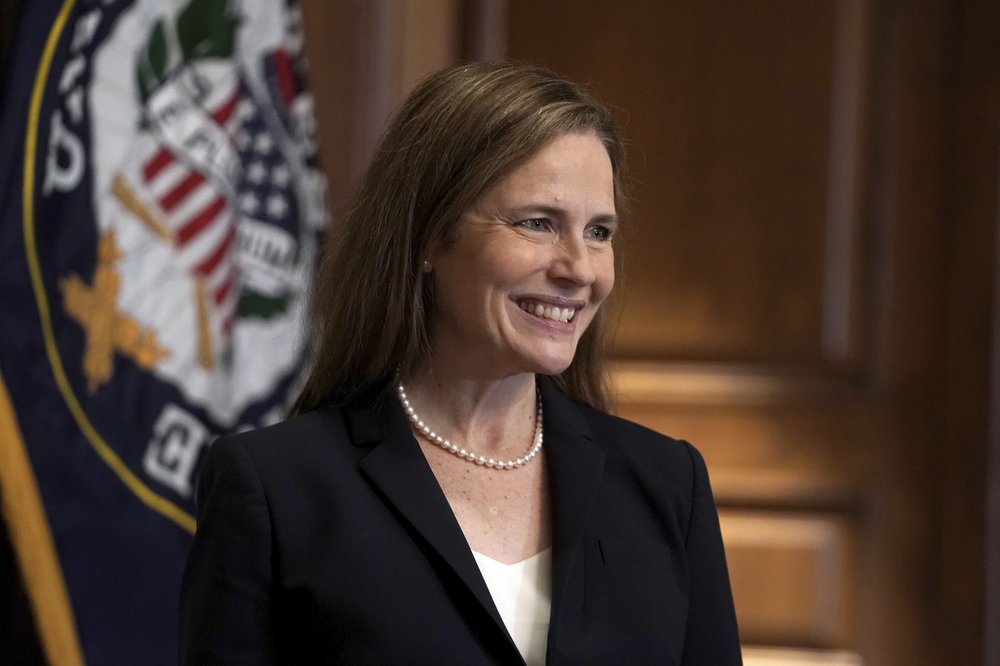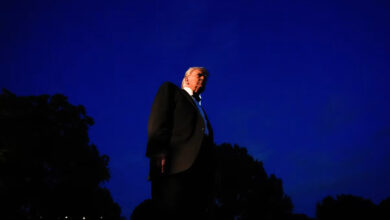
WASHINGTON (AP) — A deeply torn Senate is set to confirm Amy Coney Barrett to the Supreme Court, but Democratic leaders are asking Vice President Mike Pence to stay away from presiding over Monday’s session due to potential health risks after his aides tested positive for COVID-19.
Barrett’s confirmation is not in doubt, as Senate Republicans are overpowering Democratic opposition to secure President Donald Trump’s nominee the week before Election Day. Pence has not said if he plans to attend as is customary for landmark votes.
But Democrats said in a letter to Pence on it’s “not a risk worth taking,” according to copy obtained by The Associated Press.
Senate Democratic leader Chuck Schumer and his leadership team wrote that not only would Pence’s presence violate Centers for Disease Control and Prevention guidelines, “it also be a violation of common decency and courtesy.”
Under the Constitution, the vice president serves as the largely ceremonial role of Senate president and can break a tie vote. Pence’s vote isn’t expected to be needed. Senate Republicans control the chamber and steered their majority to seize the opportunity to install a third Trump justice, securing a conservative court majority for the foreseeable future.
“Nothing about your presence in the Senate tomorrow can be considered essential,” the Democrats wrote. They warned of the risk not just to senators but the police, restaurant workers and others who keep the Capitol running.
The 48-year-old appellate judge’s rise opens up a potential new era of rulings on abortion, gay marriage and the Affordable Care Act. A case against the Obama-era health law is scheduled to be heard Nov. 10.
Senate Majority Leader Mitch McConnell scoffed at the “apocalyptic” warnings from critics that the judicial branch was becoming mired in partisan politics as he defended its transformation under his watch.
“This is something to be really proud of and feel good about,” the Republican leader said Sunday during a rare weekend session.
McConnell said that unlike legislative actions that can be undone by new presidents or lawmakers, “they won’t be able to do much about this for a long time to come.”
Pence would typically preside over Monday’s vote, but after a close aide and others on his staff tested positive for the coronavirus, it was unclear whether he would attend. He is scheduled to hold a campaign rally in Minnesota, arriving back in Washington ahead of the expected evening vote.
Schumer, of New York, said the Trump administration’s drive to install Barrett during the coronavirus crisis shows “the Republican Party is willing to ignore the pandemic in order to rush this nominee forward.”
To underscore the potential health risks, Schumer urged his colleagues Sunday not to linger in the chamber but “cast your votes quickly and from a safe distance.” Some GOP senators tested positive for the coronavirus following a Rose Garden event with Trump to announce Barrett’s nomination, but they have since said they have been cleared by their doctors from quarantine.
The confirmation was expected to be the first of a Supreme Court nominee so close to a presidential election. It’s also one of the first high court nominees in recent memory receiving no support from the minority party, a pivot from not long ago when a president’s picks often won wide support.
Barrett presented herself in public testimony before the Senate Judiciary Committee as a neutral arbiter and suggested, “It’s not the law of Amy.” But her writings against abortion and a ruling on “Obamacare” show a deeply conservative thinker. She was expected to be seated quickly on the high court.
“She’s a conservative woman who embraces her faith. She’s unabashedly pro-life, but she’s not going to apply ‘the law of Amy’ to all of us,” the Judiciary Committee chairman, Sen. Lindsey Graham, R-S.C., said on Fox News Channel.
At the start of Trump’s presidency, McConnell engineered a Senate rules change to allow confirmation by a majority of the 100 senators, rather than the 60-vote threshold traditionally needed to advance high court nominees over objections. It was escalation of a rules change Democrats put in place to advance other court and administrative nominees under President Barack Obama.
On Sunday, the Senate voted 51-48 to begin to bring the process to a vote by launching the final 30 hours of Senate debate. Two Republicans, Lisa Murkowski of Alaska and Susan Collins of Maine, voted against advancing the nominee, and all Democrats who voted were opposed. California Sen. Kamala Harris, the vice presidential nominee, missed the vote while campaigning in Michigan.
Monday’s final tally was expected to grow by one after Murkowski announced her support for the nominee, even as she decried filling the seat in the midst of a heated race for the White House. Murkowski said Saturday she would vote against the procedural steps but ultimately join GOP colleagues in confirming Barrett.
“While I oppose the process that has led us to this point, I do not hold it against her,” Murkowski said.
Collins, who faces a tight reelection fight in Maine, remains the only Republican expected to vote against Trump’s nominee. “My vote does not reflect any conclusion that I have reached about Judge Barrett’s qualifications to serve,” Collins said. “I do not think it is fair nor consistent to have a Senate confirmation vote prior to the election.”
By pushing for Barrett’s ascension so close to the Nov. 3 election, Trump and his Republican allies are counting on a campaign boost, in much the way they believe McConnell’s refusal to allow the Senate to consider Obama’s nominee in February 2016 created excitement for Trump among conservatives and evangelical Christians eager for a Republican president to replace the late Justice Antonin Scalia.
Barrett was a professor at Notre Dame Law School when she was tapped by Trump in 2017 for an appeals court opening. Two Democrats joined at that time to confirm her, but none is expected to vote for her now.
___
Associated Press writers Mary Clare Jalonick in Washington, Meg Kinnard in Columbia, South Carolina, and Becky Bohrer in Juneau, Alaska, contributed to this report.
Image: Supreme Court nominee Amy Coney Barrett, meets with Sen. Martha McSally, R-Ariz., Wednesday, Oct. 21, 2020, on Capitol Hill in Washington. (Greg Nash/Pool via AP)




